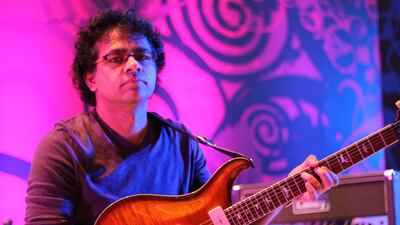If musical genres were continents, what instrument would you use on a round-the-world trip?
The answer could only have six strings, says Prasanna, whose new album All Terrain Guitar proudly advertises its landscape-hopping charms in its title. Out on August 5, the record showcases the Indian virtuoso moving between genres in a thrillingly edge-of-the-seat, cross-continent journey, fusing jazz and rock with classical Indian Carnatic music, and making pit-stops in the world of Latin, reggae and metal.
“I realised that the whole story, running from the first piece to the last, was being told by the guitar,” says the musician from his adopted home of New York.
“My personal expression is through the guitar — and it covers many territories. It’s the guitar that holds everything together.”
With anyone else in the driving seat, this journey would likely be far more bumpy. In truth, it’s not the guitar which is seamlessly navigating these diverse terrains, but the virtuoso playing it.
Prasanna is a ferocious talent, equally comfortable shredding like Eddie Van Halen as he is playing microtonal Indian ragas or mathematical bebop workouts. The guitarist's formidable chops are proved from the first few bars of opener Springtime in New York, a fiery jazz-trio track which friend A R Rahman has loudly hailed "as beautiful as chilling out in Central Park and having a masala dosa".
All Terrain Guitar marks Prasanna's first solo album since 2006's Electric Ganesha Land — an ambitious project on which traditional Carnatic musicians reinterpreted the works of Jimi Hendrix. It is easily his most personal project to date.
“An artist has to bare his or her soul — you can’t think of products,” he says. “When you do music in a pure sense, you want to give what you have, and if you have a lot, you want to keep giving.”
In the interim, the 45-year-old guitarist has been busy playing with fellow virtuosos in several celebrated groups. These include Raga Bop Trio, the fusion outfit led by former Journey drummer Steve Smith, and Raga Metal Conversations, alongside guitarist Alex Skolnick of thrash-metal band Testament.
Prasanna is also a member of Tirtha, a South Asian supergroup formed to mark 60 years of Indian independence by jazz pianist Vijay Iyer — who will perform two Holi-themed concerts at New York University Abu Dhabi on March 30 and 31. Iyer is also among the leading names featured on All Terrain Guitar, alongside fellow luminary Rudresh Mahanthappa, the explosive saxophonist who performed at NYUAD in November.
“Those guys are my friends,” says Prasanna. “I heard them in my head and just felt they’d give something to the music.”
However, the guest who adds most to the album is Prasanna’s wife, Shalini Lakshmi, whose soaring voice seamlessly takes on the role of another instrument in the ensemble and, as with the guitar, adds a second constant in this ever-changing terrain.
A celebrated performer in her own right, Lakshmi sang the title score in the soundtrack to Hollywood movie The Hundred-Foot Journey, composed by A R Rahman.
Long-term friends and collaborators, Prasanna and Rahman sit alongside sitarist Ravi Shankar among the handful of Indian composers who have scored an Oscar-winning movie, following Prasanna's work on 2009 documentary Smile Pinki.
Prasanna’s start in music can be traced back to the movies. Like Rahman, he was born and raised in Chennai, growing up immersed in Tamil film music. After a chance encounter with a neighbour’s guitar, Prasanna began playing at the age of 10, teaching himself popular film songs.
Today, he tellingly quotes prolific film composer Ilayaraja among his greatest inspirations — alongside rock maverick Frank Zappa.
Later, he began the formal study of Carnatic music, under the guru Tiruvarur Balasubramaniam. Today, Prasanna is renowned as one of the few players to perform Indian classical music on guitar, and has recorded more than 10 albums of traditional material.
He is also a specialist lecturer and teacher who has coached musicians including Dweezil Zappa — Frank’s son — in Carnatic traditions, and founded India’s Swarnabhoomi Academy of Music.
Prasanna discovered rock in his teens, and it was while touring India in cover acts, jamming nightly on the classic repertoire, that he devised a revelatory way to play traditional Indian quarter-tones on an unmodified electric guitar.
Rock led to fusion and jazz, and Prasanna’s inimitable technique was solidified when, in the late 1990s, he gave up a comfy career in engineering and IT to move to the United States and study jazz and classical composition at Boston’s Berklee College of Music.
It is Prasanna’s depth of knowledge in these four distinct musical schools — Tamil film music, Carnatic tradition, rock/metal and jazz — and the fluidity with which he blurs them that makes his work so compelling.
Barriers and borders do not exist — these different musical languages have been so thoroughly assimilated that the fusion of traditions is always unconscious, and never forced. In his own eyes, such an assimilation could have only have happened on the guitar. And it all began four decades ago, with that chance encounter with a neighbour’s guitar.
“For me, guitar is a connecting force that has a very special place in the world,” he says. “It was the first instrument I saw when I was 5 years old. If I’d played the sitar, then I would never have achieved what I have today. It’s all guitar — and all music.”
rgarratt@thenational.ae

